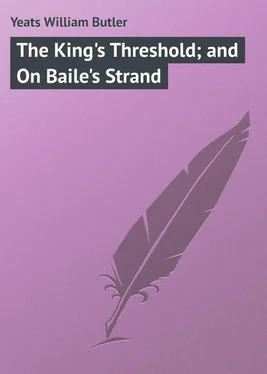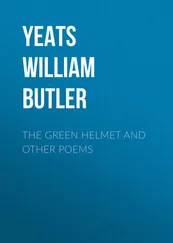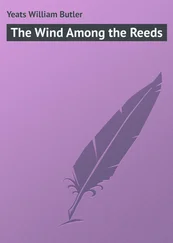William Yeats - The King's Threshold; and On Baile's Strand
Здесь есть возможность читать онлайн «William Yeats - The King's Threshold; and On Baile's Strand» — ознакомительный отрывок электронной книги совершенно бесплатно, а после прочтения отрывка купить полную версию. В некоторых случаях можно слушать аудио, скачать через торрент в формате fb2 и присутствует краткое содержание. ISBN: , Издательство: Иностранный паблик, Жанр: foreign_prose, foreign_dramaturgy, на английском языке. Описание произведения, (предисловие) а так же отзывы посетителей доступны на портале библиотеки ЛибКат.
- Название:The King's Threshold; and On Baile's Strand
- Автор:
- Издательство:Иностранный паблик
- Жанр:
- Год:неизвестен
- ISBN:http://www.gutenberg.org/ebooks/41102
- Рейтинг книги:3 / 5. Голосов: 1
-
Избранное:Добавить в избранное
- Отзывы:
-
Ваша оценка:
- 60
- 1
- 2
- 3
- 4
- 5
The King's Threshold; and On Baile's Strand: краткое содержание, описание и аннотация
Предлагаем к чтению аннотацию, описание, краткое содержание или предисловие (зависит от того, что написал сам автор книги «The King's Threshold; and On Baile's Strand»). Если вы не нашли необходимую информацию о книге — напишите в комментариях, мы постараемся отыскать её.
The King's Threshold; and On Baile's Strand — читать онлайн ознакомительный отрывок
Ниже представлен текст книги, разбитый по страницам. Система сохранения места последней прочитанной страницы, позволяет с удобством читать онлайн бесплатно книгу «The King's Threshold; and On Baile's Strand», без необходимости каждый раз заново искать на чём Вы остановились. Поставьте закладку, и сможете в любой момент перейти на страницу, на которой закончили чтение.
Интервал:
Закладка:
Because I am King, because if I give way
My nobles would call me a weakling, and it may be
The very throne be shaken; but should you
That are his friends speak to him and persuade him
To turn his mouth from the ill-savouring grave
And eat good food, he shall not lack my favour;
For I will give plough-land and grazing-land,
Or all but anything he has set his heart on.
It is not all because of my good name
I’d have him live, for I have found him a man
That might well hit the fancy of a king
Banished out of his country, or a woman’s,
Or any other’s that can judge a man
For what he is. But I that sit a throne,
And take my measure from the needs of the state,
Call his wild thought that over-runs the measure,
Making words more than deeds, and his proud will
That would unsettle all, most mischievous,
And he himself a most mischievous man.
Senias.
King, whether you did right or wrong in this
Let the King say, for all that I need say
Is that there’s nothing that cries out for death
In the withholding of that ancient right,
And that I will persuade him. Your own words
Had been enough persuasion were it not
That he is lost in dreams that hunger makes,
And therefore heedless, or lost in heedless sleep.
King.
I leave him to your love, that it may promise
Plough-lands and grass-lands, jewels and silken wear,
Or anything but that old right of the poets.
[ He goes out. The Pupils , who have been standing perfectly quiet, all turn towards Seanchan , and move a step nearer.
Senias.
The King did wrong to abrogate our right,
But Seanchan, who talks of dying for it,
Talks foolishly. Look at us, Seanchan,
Waken out of your dream and look at us,
Who have ridden under the moon and all the day,
Until the moon has all but come again,
That we might be beside you.
[Seanchan turns half round leaning on his elbow, and speaks as if in a dream.
Seanchan.
I was but now
At Almhuin, in a great high-raftered house,
With Finn and Osgar. Odours of roast flesh
Rose round me and I saw the roasting spits,
And then the dream was broken, and I saw
Grania dividing salmon by a pool,
And then I was awakened by your voice.
Senias.
It is your hunger that makes you dream of flesh
Roasting, and for your hunger I could weep;
And yet the hunger of the crane that starves
Because the moonlight glittering on the pool
And flinging a pale shadow has made it shy,
Seems to me little more fantastical
Than this that’s blown into so great a trouble.
Seanchan.
[ Who has turned away again. ]
There is much truth in that, for all things change
At times, as if the moonlight altered them,
And my mind alters as if it were the crane’s;
For when the heavy body has grown weak
There’s nothing that can tether the wild mind
That being moonstruck and fantastical
Goes where it fancies. I had even thought
I knew your voice and face, but now the words
Are so unlikely that I needs must ask
Who is it that bids me put my hunger by?
Senias.
I am your oldest pupil, Seanchan;
The one that has been with you many years,
So many that you said at Candlemas
That I had almost done with school, and knew
All but all that poets understand.
Seanchan.
My oldest pupil. No, that cannot be;
For it is someone of the courtly crowds
That have been round about me from sunrise
And I am tricked by dreams, but I’ll refute them.
I asked the pupil that I loved the best,
At Candlemas, why poetry is honoured,
Wishing to know how he’d defend our craft
In distant lands among strange churlish Kings.
And he’d an answer.
Senias.
I said the poets hung
Images of the life that was in Eden
About the childbed of the world, that it,
Looking upon those images, might bear
Triumphant children; but why must I stand here
Repeating an old lesson while you starve?
Seanchan.
Tell on, for I begin to know the voice;
What evil thing will come upon the world
If the arts perish?
Senias.
If the arts should perish
The world that lacked them would be like a woman
That looking on the cloven lips of a hare
Brings forth a hare-lipped child.
Seanchan.
But that’s not all.
For when I asked you how a man should guard
Those images you had an answer also,
If you’re the man that you have claimed to be,
Comparing them to venerable things
God gave to men before he gave them wheat.
Senias.
I answered, and the word was half your own,
That he should guard them, as the men of Dea
Guard their four treasures, as the Grail King guards
His holy cup, or the pale righteous horse
The jewel that is underneath his horn,
Pouring out life for it, as one pours out
Sweet heady wine – but now I understand
You would refute me out of my own mouth;
And yet a place at table near the King
Is nothing of great moment, Seanchan.
How does so light a thing touch poetry?
[Seanchan is now sitting up. He still looks dreamily in front of him.
Seanchan.
At Candlemas you called this poetry
One of the fragile mighty things of God
That die at an insult.
Senias.
[ To other Pupils.] Give me some true answer.
For on that day we spoke about the court
And said that all that was insulted there
The world insulted, for the courtly life,
Being the first comely child of the world,
Is the world’s model. How shall I answer him?
Can you not give me some true argument?
I will not tempt him with a lying one.
Arias.
[ Throwing himself at Seanchan’s feet. ]
Why did you take me from my father’s fields?
If you would leave me now, what shall I love?
Where shall I go, what shall I set my hand to?
And why have you put music in my ears
If you would send me to the clattering houses?
I will throw down the trumpet and the harp,
For how could I sing verses or make music
With none to praise me and a broken heart?
Seanchan.
What was it that the poets promised you
If it was not their sorrow? Do not speak.
Have I not opened school on these bare steps,
And are not you the youngest of my scholars?
And I would have all know that when all falls
In ruin, poetry calls out in joy,
Being the scattering hand, the bursting pod,
The victim’s joy among the holy flame,
God’s laughter at the shattering of the world,
And now that joy laughs out and weeps and burns
On these bare steps.
Arias.
O Master, do not die.
[ Three men come in. Cian and Brian , old men carrying basket with food, and Mayor of Kinvara . They stand at the side listening.
Senias.
Trouble him with no useless argument.
Be silent; there is nothing we can do
Except find out the King and kneel to him
And beg our ancient right. These three have come
To say whatever we could say and more,
And fare as badly. Come, boy, that’s no use;
[ He lifts the Boy up.
If it seem well that we beseech the King,
Lay down your harps and trumpets on the stones
In silence and come with me silently.
Come with slow footfalls and bow all your heads,
For a bowed head becomes a mourner best.
[They lay the harps and trumpets down one by one and then go out very solemnly and slowly, following one another.
Cian.
Let’s show the food that’s in the basket.
Mayor.
[ Who carries an Ogham stick. ] No,
I must get through my speech or I’ll forget it;
Besides, there is no reason why he’d eat
Till he has heard my reasons.
Cian.
It were better
To show what we have brought him in the basket,
For we have nothing that he has not liked
From boyhood.
Brian.
For we have not brought kings’ food
That’s cooked for everybody and nobody.
Mayor.
You are not showing right respect to me,
Or to the people of Kinvara, when you wish
That something else should come before my message.
Seanchan.
What brings you here? I never sent for you.
Cian.
He must be famishing, he looks so pale.
We had better get the food out first. I tell you,
That we have brought the things he likes the best.
Mayor.
No, no; I lost a word at every cross road
And maybe if I do not speak it now
I’ll have forgot it.
Cian.
Well, out with it quickly.
Seanchan.
Why, what’s this foolery?
Mayor.
No foolery;
A message from the richest, best born townsman
Of your own town, and from your aged father.
Cian.
Run through it while I am getting out the food.
Mayor.
How was I to begin? What was the word
That was to keep it in my memory?
Wait, I have notched it on this Ogham stick.
“Chief poet,” “Ireland,” “Townsman”; that is it.
Chief poet of Ireland, when we heard that trouble
Had come between you and the King of Ireland
It plunged us in deep sorrow, part for you,
Our honoured townsman, part for our good town.
The King was said to be most friendly to us,
And we had reasons, as you’ll recollect,
For thinking that he was about to give
Those grazing lands inland we so much need,
Being pinched between the water and the rocks.
But now his friendliness being ill repaid
Will be turned from us and our town get nothing.
But there was something else – I’ll find the word
That was to keep it in my memory.
“Pride” – that’s the word, – we would not have you think,
Weighty as these considerations are,
That they have been as weighty in our minds
As our desire that one we take much pride in,
A man who has been an honour to our town,
Should live and prosper, therefore we beseech you
To give way in a matter of no moment,
A matter of mere sentiment, a trifle,
That we may always keep our pride in you.
Seanchan.
Their pride, their pride, what do they know of pride?
My pupils do not know it, for they beg
From the King’s favour what is theirs by right,
And how can men, that God has made so weak
They need a rich man’s favour every day,
Know anything of pride?
Cian.
[ To Mayor.] You have spoken it wrongly.
You have forgotten something out of it about the cattle dying.
Mayor.
Maybe you do not know, being much away,
How many of our cattle died last winter
From lacking grass, and that there was much sickness
Because the poor had nothing but salt fish
To live upon. The people all came out
And stood about the doors as I went by.
Seanchan.
What would you have of me?
For there are men that shall be born at last
And find sweet nurture that they may have voices
Even in anger like the strings of harps.
Yet how could they be born to majesty
If I had never made the golden cradle?
Mayor.
What is it? “Father” – “Mother”; that is it;
Your father sends this message.
Cian.
He is listening.
Mayor.
He says that he is old and that he needs you,
And that the people will be pointing at him
And he not able to lift up his head
If you should turn the King’s favour away.
And he adds to it, that he cared you well,
And you in your young age, and that it’s right
That you should care him now.
Cian.
And when he spoke
He cried because the stiffness of his bones
Prevented him from coming.
Mayor.
But your mother
Has sent no message, for when they had told her
The way it is between you and the King
She said, “No message can do any good,
He will not send the answer that you want;
We cannot change him,” and she went indoors,
Lay down upon her bed and turned her face
Out of the light. And thereupon your father
Said, “Tell him how she is, and that she sends
No message.” I have nothing more to say.
Cian and Brian, you can set out the food.
Интервал:
Закладка:
Похожие книги на «The King's Threshold; and On Baile's Strand»
Представляем Вашему вниманию похожие книги на «The King's Threshold; and On Baile's Strand» списком для выбора. Мы отобрали схожую по названию и смыслу литературу в надежде предоставить читателям больше вариантов отыскать новые, интересные, ещё непрочитанные произведения.
Обсуждение, отзывы о книге «The King's Threshold; and On Baile's Strand» и просто собственные мнения читателей. Оставьте ваши комментарии, напишите, что Вы думаете о произведении, его смысле или главных героях. Укажите что конкретно понравилось, а что нет, и почему Вы так считаете.












